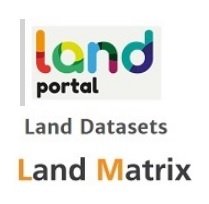Discover open Land Linked Datasets shared by the Land Portal
12/02/2018


Are you looking for sets of data related to land?
Visit the Land Portal and discover the lists of different datasets available and get detailed information on each of them !
ACCESS TO DATA TO SUPPORT LAND GOVERNANCE ... THIS NEEDS COMMITMENT
|
Goal 1.4 of the Sustainable Development Goals commits the world to: "By 2030, ensure that all men and women, in particular the poor and the vulnerable, have equal rights to economic resources, as well as access to basic services, ownership and control over land and other forms of property, inheritance, natural resources, appropriate new technology and financial services, including microfinance." |
Land governance is central to Sustainable Development... But without better access to data and information, many opportunities to improve land governance are being lost.
Moreover, with climate change increasing pressures on land, and the legacy of large-scale land deals in recent years, meeting this goal requires actions from many different stakeholders. These actions need to be supported by clear, accessible and inclusive data and information.
.jpg)
THE LAND PORTAL FOR EQUITABLE ACCESS TO DATA
The Land Portal (set up in 2009) aims to support the efforts of the rural people to gain equitable access to information resources on land and to secure land rights. In accordance with its vision, values and theory of change, the Land Portal:
- Serves as a leading online knowledge broker for information related to land issues;
- Directs users to the great variety of sources that publish land-related information online;
- Advocates for the adoption of cutting-age linked open data (LOD) technologies and open standards in the land sector.
Land Portal Foundation partners provide technical support to many organizations in the Global South, thus contributing to the development of a more inclusive land governance information ecosystem.
.jpg)
# LINKING OPEN DATA & LAND RIGHTS
The concepts like data, big data and open data can often seem complicated, convoluted and at times, even distant words that have little meaning in our daily lives. More importantly for the purposes of Land Portal's work, is to understand how these concepts can lead to better land governance for the rural poor.
Land Portal Foundation helps its community of practice create, curate and disseminate Land Governance Data and information, and, in this way, become part of a more inclusive information landscape.
.jpg)
# DATA AGGREGATION
The Land Portal Foundation collects, link and disseminates knowledge and (meta)data from various information providers around the world, from global organizations to local ones. In this framework, the Land Portal website:
- Serves as an intuitive gateway to the different information providers on land-related issues;
- Improves the potential impact of each knowledge piece significantly, because all the fragmented data sources are linked together.
|
>>> Discover the lists of different DATASETS available and get detailed information on each of them. |
.jpg)
# LANDVOC : AN OPEN STANDARDIZED VOCABULARY ON LAND
The Land Portal Foundations supports land-focused organizations around the world in adopting and implementing Open Data standards and principles.
These standards include also LandVoc (with up to 300 land-related concepts/terms about land governance), - a standardized vocabulary on land that topically classifies resources based on subject matter using keywords. LandVoc is also a distinct concept scheme within AGROVOC. LandVoc pulls concepts scattered throughout the AGROVOC hierarchy and re-structures them into a hierarchy designed for people working on land tenure, land management and land governance.
Using a controlled vocabulary such as LandVoc ensures that all information is topically classified in the same way (regardless of different languages, the use of synonyms or others) and makes sure that the keywords also can be read by machines. Therefore machines will also be able to understand what the resource is about. This makes sure that the land-related information in any database can be linked together to other databases, because machines can understand which resources address the same topics.
|
>>> Discover LandVoc overarching Categories & Concepts and get detailed information on each of them. |
LandVoc is primarily derived from the Food and Agriculture Organization of the United Nation’s (FAO) AGROVOC multilingual thesaurus for agriculture. In particular, LandVoc is built as a separate scheme on the backbone of AGROVOC. In this way, LandVoc not only uses AGROVOC stable URIs to describe its land-specific terminology identities (i.e.concepts, terms), but also is automatically connected through these URIs with the new Global Agriculture Concepts Scheme (GACS).
* Learn more about the Land Portal & Get Involved
* For any questions or comments regarding the Land Portal's knowledge products, please contact [email protected]
Related:
- AgroPortal: a backbone for data integration and standardization in Agronomy
- Sextortion and Land Governance: what is it and how can it be tackled? (recorded webinar)
- Recorded Webinar on Linked Data Competency Index : Mapping the field for Teachers and Learners
- Outputs UDC Seminar 2017 "Faceted Classification Today" (Presentation slides; Posters and poster presentations). The Universal Decimal Classification (UDC) is the world's foremost multilingual classification scheme for all fields of knowledge, a sophisticated indexing and retrieval tool
- RDA 11th Plenary Joint meeting:Supporting effective engagement with research & open data in the agriculture and nutrition. Lessons from IGAD & GODAN Action
- FOCUS ON SEMANTICS FOR... FOOD & AGRICULTURE
- Developing Data Interoperability using standards: A Wheat Community use case
- VEST Registry (Knowledge Organisation Systems)
- Dzalé Yeumo E, Fulss R, Alaux M, et al.: Wheat Data Interoperability Guidelines, Ontologies and User Cases. Recommendations from the RDA Wheat Data Interoperability Working Group. EUDAT B2Share.2017
-
Subirats I, Cooper L, Shrestha R, et al.: Towards a Comprehensive Overview of Ontologies and Vocabularies for Research on Wheat. Zenodo. 2015
|
To stay tuned for new updates from the AIMS community, Become AIMS member (for free), follow @AIMS_Community on Twitter. |
